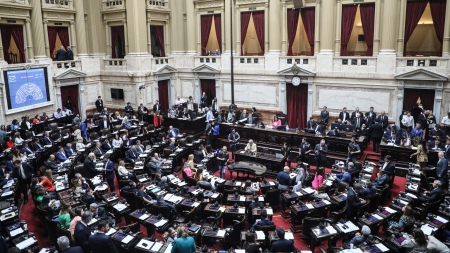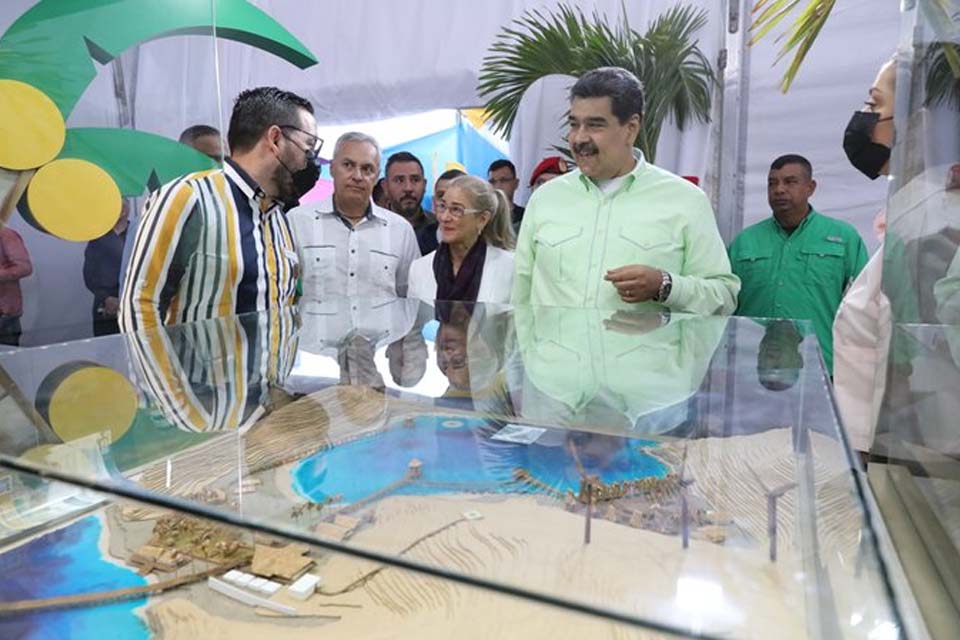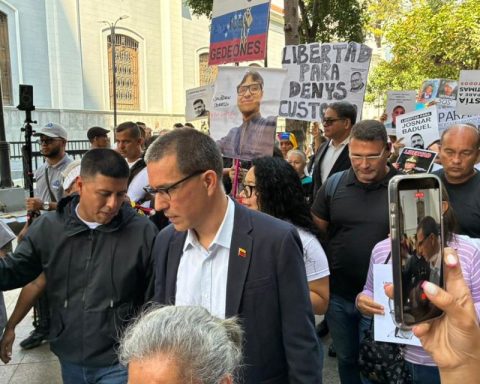A plenary session of the Education and Budget and Treasury committees of the Chamber of Deputies endorsed five bills proposing the creation of the universities of the Cuenca del Salado, in Cañuelas (Buenos Aires); from Ezeiza (Buenos Aires); from Rio Tercero (Córdoba); Juan Ortíz (Paraná-Entre Ríos) and the Mothers of Plaza de Mayo, in the City of Buenos Aires.
The ruling party obtained a majority opinion with the support of Evolución Radical (with partial dissidents) and other minority blocs, so the texts were ready to be dealt with in the special session scheduled for next Thursday, at 1:00 p.m., together with those that establish the creations of the universities of Delta, del Pilar and Saladillo, endorsed in commission several weeks ago.
The PRO and the Civic Coalition strongly questioned the projects and issued a minority opinion, while the UCR joined the column with that position, except for its accompaniment to that of Rio Tercero.
The project for the creation of the University of the Cuenca del Río Salado was presented by the national deputy mandate fulfilled and current Buenos Aires Minister of Environment Daniela Vilar (FdT), and foresees that its headquarters will be in the city of Cañuelas, with sub-sites in localities of that hydric region.
In its recitals it says that it will favor the implementation of short careers with professional practice and training cycles with certification that respond to problems and strategic needs of the region.
The initiative that gives the existing National University Institute of Human Rights Madres de Plaza de Mayo the character of “national” arises from a file presented more than two years ago by the national deputy and leader of the Central of Argentine Workers, Hugo Yaski ( FdT).
Its contents will be oriented towards the defense, protection, investigation and promotion for the effective exercise of human rights, as derived from the national Constitution, international treaties on the matter and national laws.
The project that establishes the creation of the National University of Ezeiza belongs to the former deputy and current Minister of Social Development Victoria Tolosa Paz (FdT); and provides careers and extension and research actions linked to airport, technological and human development and organizations.
The one that proposes the foundation of the Juan Ortiz University, in Paraná, was drafted by Blanca Osuna (FdT) and will be established on the basis of the current Faculty of Humanities, arts and social sciences of the Autonomous University of Entre Ríos.
“Of the four faculties that Uader has -Humanities, Management Sciences, Life and Health Sciences and Science and Technology- only one, Humanities, concentrates 44% of the enrollment. Of 29,322 students that the university has, 12,953 are concentrated in that academic unit,” explained the legislator.
Finally, the project that establishes the creation of the National University of Rio Tercero, is based on two initiatives of different political sign: that of Gabriela Estévez (FdT) and that of Gabriela Brower de Koning (Radical Evolution).
Both authors agree that the proposal echoes the demand of the community of that city, expressed through its deliberative council, to advance in its creation with the aim of contributing to the historical reparation of its inhabitants as a consequence of the attack on the Rio Tercero military factory in 1995.
“Local and regional development should be supported, especially considering that it is an important industrial hub, generating greater educational and job opportunities, favoring the establishment of young people,” they said.
During the debate, Osuna, president of the Education Commission, stressed that “regarding access to universities and their creation, the State has the responsibility, in terms of inclusion and democratization, to provide different policies so that this opportunity can materialize. ”.
From the ruling party, Yasky considered that “the creation of universities corresponds to processes in motion that are enriching the educational fabric and giving it academic density. Educational quality and inclusion cannot be conflicting concepts.”
From the Left, Romina del Pla, pointed out: “It seems to me that it should be clear, in this project, that they are going to recognize their status as national universities with the recognition of the application of the Collective Bargaining Agreement, which would be a guarantee to go out”.
On behalf of Evolución Radical, Danya Tavella said that “the province of Buenos Aires is the most densely populated province in the country, where the highest level of production is also recorded and the highest level of economic activity is concentrated. This makes it essential that we have more prepared and trained human resources to competitively face the challenges that the economy of Argentina and the world need.”
“That is why, in general terms, I support the creation of universities because indeed, as all the data from the world economy show, the more preparation, the greater the individual salary level and the contribution to the generation of wealth. And that It is what universities do, generate greater competitiveness for the territory and for the people who live in it and generate a higher level of institutional quality and citizenship”, he completed.
The legislator countered with these foundations the argument of her partner in the interblock, the PRO member, Sabrina Ajmechet, who lamented that “of the last 17 universities that were created, 17 are in Buenos Aires territory and seven in the rest of the country.”
Against the project, Maximiliano Ferraro (Civic Coalition), said that “the strategic planning of higher education must be a virtuous path that we are not having at all here with these opinions to the dealer and the creation of universities as if it were a factory of churros in what we are taking ahead”.
“There is no predictability, we do not clearly guarantee a sustainable allocation of resources. And it is not only about creating more institutions but also about how we improve the indicators: the quality and articulation with the compulsory levels of education”, he completed.
In her turn, the deputy Mónica Litza (Frente de Todos) celebrated the creation of the National University of Ezeiza and was proud “that we are dealing with these projects and that in Argentina there are many public, free and nearby universities.”
In disagreement, the deputy Alejandro Finocchiaro (PRO) also referred to the nationalization of the University of Ezeiza, currently in the hands of the provincial management, noting that, according to the project, the exchange of management “happens without the authorities constituted in March 2019, that is to say that university autonomy is violated”.
“I would like to call for reflection and think that violating university autonomy is something that has never been done in 39 years of democracy,” he remarked.
Meanwhile, Brouwer de Koning (PRO) defended the creation of the National University of Río Tercero.
“Río Tercero is a resilient city that continues to bet, because 27 years ago the National State engineered a tragedy. That same National State must be the one that repairs and the one that returns the opportunities to dream again and project again ”, he pointed out.
Marcelo Casaretto (Frente de Todos) referred to the creation of the Juan Laurentino Ortiz National University, based in Paraná: “It is a university that is developing, has a strong presence and is sustaining itself with strong investment from the entrerrianos. This project gives it a hierarchy, which will allow the development of this important university community”.


















